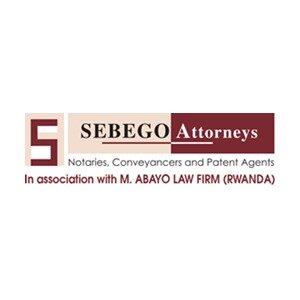Best Bankruptcy Lawyers in Botswana
Share your needs with us, get contacted by law firms.
Free. Takes 2 min.
Or refine your search by selecting a city:
List of the best lawyers in Botswana
About Bankruptcy Law in Botswana
Bankruptcy in Botswana is a legal process where individuals or businesses that are unable to repay their outstanding debts to creditors can seek relief from some or all of their liabilities. The process is governed by the Insolvency Act, aimed at providing a fair distribution of the individual's or entity's remaining assets among creditors while offering the debtor a fresh start. Bankruptcy proceedings are conducted in the High Court, and once declared bankrupt, certain legal protections and restrictions apply to the debtor.
Why You May Need a Lawyer
Engaging a lawyer can be crucial in several situations related to bankruptcy in Botswana. These include navigating complex paperwork, understanding the implications of bankruptcy on your financial future, interacting with creditors, and representing your interests in court. Legal advice is especially valuable if you're at risk of losing significant assets, need assistance in restructuring debt, or wish to explore alternatives to filing for bankruptcy.
Local Laws Overview
In Botswana, the Insolvency Act is the primary legal framework governing bankruptcy. Key aspects include the eligibility criteria for declaring bankruptcy, the process for filing a petition, the appointment of a trustee to oversee asset distribution, and the discharge procedures once debts have been settled as per legal stipulations. Botswana's courts have jurisdiction over bankruptcy cases, ensuring compliance with legal standards and protecting the interests of all parties involved. Understanding these aspects is vital for anyone involved in the bankruptcy process to ensure adherence to local law.
Frequently Asked Questions
What is the difference between insolvency and bankruptcy in Botswana?
Insolvency refers to the inability to pay debts when due, whereas bankruptcy is a legal declaration of insolvency made by a court that initiates the orderly settlement of debts.
Who can file for bankruptcy in Botswana?
Both individuals and corporate entities can file for bankruptcy in Botswana if they meet the legal requirements prescribed in the Insolvency Act.
What are the consequences of being declared bankrupt?
Being declared bankrupt can result in the loss of control over certain assets, restrictions on financial operations, and long-term impacts on creditworthiness.
How does the court handle bankruptcy cases?
The High Court oversees bankruptcy cases, appointing a trustee to manage asset distribution and ensuring that proceedings comply with legal norms.
Can businesses continue to operate after filing for bankruptcy?
In some cases, businesses may continue to operate under certain conditions, often depending on the court and the specifics of a restructuring plan.
What role do creditors play in the bankruptcy process?
Creditors are involved in determining the claims against the bankrupt entity and share in the distribution of assets managed by the trustee.
How long does bankruptcy last in Botswana?
The duration of bankruptcy can vary based on the complexity of the case and the satisfaction of debts as per the local laws, typically lasting several years.
Can debts be excused through bankruptcy?
Certain debts may be discharged following the completion of the bankruptcy process, although not all debts qualify for discharge.
What is a trustee's role in bankruptcy proceedings?
The trustee manages the bankrupt estate, oversees the asset distribution process, and ensures compliance with the Insolvency Act.
Are there alternatives to filing for bankruptcy?
Yes, alternatives such as debt restructuring, negotiation with creditors, or entering into voluntary agreements may be available depending on the situation.
Additional Resources
For individuals requiring assistance, it is beneficial to consult the following resources in Botswana:
- The Registrar of the High Court for forms and documentation.
- Legal Aid Botswana, which provides pro bono legal services.
- The Botswana Insolvency Practitioners Association for expert guidance.
- The Ministry of Finance and Economic Development for information on regulations and policies.
Next Steps
If you need legal assistance with bankruptcy, consider taking the following steps:
- Consult with a qualified insolvency lawyer to assess your situation.
- Gather all relevant financial documents and information regarding your debts and assets.
- Schedule a consultation with a legal aid office if you require financial assistance for legal services.
- Research and inquire about potential trustees or insolvency practitioners who can manage your case.
Engaging with these resources and professionals will help you navigate the complexities of bankruptcy proceedings and ensure that your legal and financial interests are protected.
Lawzana helps you find the best lawyers and law firms in Botswana through a curated and pre-screened list of qualified legal professionals. Our platform offers rankings and detailed profiles of attorneys and law firms, allowing you to compare based on practice areas, including Bankruptcy, experience, and client feedback.
Each profile includes a description of the firm's areas of practice, client reviews, team members and partners, year of establishment, spoken languages, office locations, contact information, social media presence, and any published articles or resources. Most firms on our platform speak English and are experienced in both local and international legal matters.
Get a quote from top-rated law firms in Botswana — quickly, securely, and without unnecessary hassle.
Disclaimer:
The information provided on this page is for general informational purposes only and does not constitute legal advice. While we strive to ensure the accuracy and relevance of the content, legal information may change over time, and interpretations of the law can vary. You should always consult with a qualified legal professional for advice specific to your situation.
We disclaim all liability for actions taken or not taken based on the content of this page. If you believe any information is incorrect or outdated, please contact us, and we will review and update it where appropriate.
Browse bankruptcy law firms by city in Botswana
Refine your search by selecting a city.














